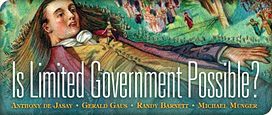Mike Munger quotes me as saying: “What de Jasay and so many classical liberals cannot bear is that an expansive welfare state has been supported largely because the majority of voters and politicians believe it is fair and just”. He asks: “Seriously, what kind of riposte is it that?” And he adds “65% of the voters and politicians believe that little green men crashed at Roswell.”
I am perplexed by Mike Munger’s reply: I maintained that the welfare state is not based on a power grab based on the pursuit of interests but on the majority’s sense of fairness, and he replies that the majority is stupid and that the results are not fair. But that is just not the point. The debate between de Jasay and me was: pursuit of interest or belief in fairness? Munger replies: stupid and not fair. My claim was that the problem was not that interests are unbound, but that classical liberals have a very different understanding of the moral limits of government than their fellow citizens.
Since Munger has raised the polemic ante, I’ll see him and raise.
Leaving aside the fact that Munger’s “reply” is largely irrelevant to what I said, the interesting thing about what he says is that so many classical liberals just cannot help attacking democracy, even when the debate is not about democratic competency but about motivation. Classical liberals — especially those with economics backgrounds — just love to attack democracy.
Munger stresses that “democracy is so dangerous.” Here is the problem of classical liberals of his ilk: the only form of political organization that has had a sustained history of avoiding repressive government is “dangerous.” I take it that Munger is basing his claim on the history of the twentieth century and just how terribly dangerous democracies were to the world. So what are the good old non-democratic times when people were truly free? Well, maybe it was the United States in the 19th century — but then slavery doesn’t look so awfully freedom-enhancing, does it? How about the United Kingdom In the 19th century? Of course there was the Act of Uniformity, the Test Acts and the Penal Laws that disadvantaged Catholics. And then there was the Six Acts in 1819 which curtailed civil liberty, which strikes many of us as dangerous. No ignorant public ruling then, just a better-educated upper class repressing some. Of course Catholics were emancipated by 1829; but then we get the reform Act of 1832 and — gasp — the beginnings of that dangerous invention known as democracy.
Maybe the Golden Age was when we no longer had rule by the aristocracy but had not yet succumbed to the horror of giving the ignorant workers something so “dangerous” as a vote. The Irish probably would have disagreed. Maybe we should look to non-democratic havens such as Pinochet’s Chile. After all, if it had a privatized pension system it must have been a beacon of liberty. There is always the model of Hong Kong under the British as the general model of how to institutionalize freedom in the world. If you are desperate for a truly non-dangerous non-democratic government, maybe your ideal is Singapore.
It is such a pity that so many of today’s classical liberals such as Munger have talked themselves into being anti-democrats. The long slide of classical liberalism since J.S. Mill — from a plausible political theory to a sort of irrelevant cranky complaint about the modern world — is all too apparent. Mill was well aware of the dangers and infirmities of democracy; he did not need Bryan Caplan’s book to know that there was a “low grade of intelligence” on the part of many voters. But he did not become an an anti-democrat (when that view was not confined to cranks) because he knew that no group of people — not even public choice economists — can be trusted to govern in a way that even has a chance of respecting the freedom of all. Of course democratic government is flawed. Duh. But anyone who thinks that somehow widespread freedom and democratization are inversely related … well, such a person is apt to be a contemporary classical liberal, I’m afraid.

